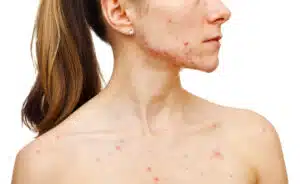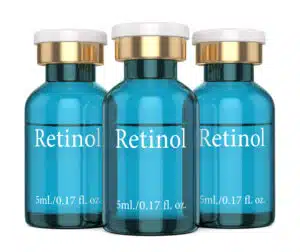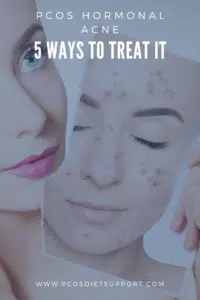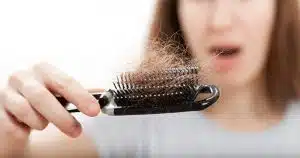Most women only have to worry about hormonal acne when their periods are imminent, but PCOS has taken your hormones on an unwanted rollercoaster ride. During particularly bad stretches, it seems like every day you wake up and discover a new pimple on your face or body. How do you put a stop to PCOS hormonal acne?
The following treatments may reduce your PCOS hormonal acne:
- Dietary changes
- Retinoids
- Antiandrogen medications
- Oral contraceptives
- Stress-busting activities
In today’s post, we’ll explain why having PCOS causes hormonal acne to flare up, how the above treatments can help, and whether your diet can worsen or reduce your rate of acne. Although having hormonal acne is tough at any age, you’ll soon be able to take a more proactive approach to your skincare.
Understanding PCOS Hormonal Acne
Acne is one of the trademark symptoms of PCOS due to the hormonal imbalances caused by the condition. Those imbalances start in your brain, specifically, the pituitary gland.

Progesterone keeps your cycles regular, which is already an issue for women with PCOS. Estrogen helps your secondary sex characteristics develop as a young woman, including armpit and pubic hair, wide hips, and breasts. After puberty, estrogen maintains uterine growth during your period.
Usually, your pituitary gland will determine how much testosterone, progesterone, and estrogen you need at any given point and then produce the hormones accordingly. Yet with PCOS, the signals that tell your brain to make more hormones get halted. This can increase testosterone and reduce progesterone and estrogen, and that’s what leads to your hormonal acne (1) .
All the other causes of acne still apply as well. If your PCOS medication has regulated your menstrual cycle, then you may get hormonal acne during PMS and/or throughout your cycle. Failing to drink enough water, taking medications like corticosteroids, and wearing too much makeup can also cause and worsen acne.
Noticing a huge pimple on your face when you’re supposed to give a big presentation at work today is going to cause stress. So too can the plummeting self-esteem from the PCOS-caused acne and other symptoms of PCOS as well, including weight gain, hair growth, and an irregular period. Sadly though, stress only makes acne worse, creating a vicious cycle.
5 Ways to Treat PCOS Hormonal Acne
Each time you go to the grocery store, you always pick up a new (and often expensive) acne product. You’re the first to try all the latest skincare trends too, including masks made of nearly any ingredient. Yet no matter what you slather onto your skin, nothing ever seems to work.
Since your PCOS-caused acne is hormonal, you need more than the average over-the-counter acne treatment to fix it.
Dietary Changes
As you know, PCOS hormonal acne is caused by the underlying hormonal imbalance caused by PCOS. One of the main culprits for acne is high androgens or high testosterone. If you really want to get the root of the problem, you need to do what you can to manage those androgen levels.

So, if you can manage your insulin levels, you will be more able to manage your testosterone levels.
Now, I can already hear you asking, “What should I be eating or avoiding to lower my testosterone?”
Having worked with thousands of women with PCOS, it is my experience that dairy is very often linked with acne. Once women eliminate dairy, acne can clear up in as quickly as two weeks.
I know giving up dairy is a big ask but there is a lot of research that suggests that dairy can make your PCOS symptoms worse, including hormonal acne.
I have written an in-depth article on dairy here and you can find out more about the dietary changes recommended for women with PCOS in this article on the best PCOS diet.
If you have tried dietary changes and you’re still struggling with acne, you may want to set up an appointment with your doctor or dermatologist and discuss the following treatment options.
Retinoids
Your first option is a retinoid. The vitamin A in retinoids activates the growth of epithelial cells and bone tissue, improves the immune system, and may even enhance vision health according to this report (2).
Depending on your age, you may have thought you needed to wait a while to use retinoids, since aren’t they mostly used to combat wrinkles? Tretinoin is an anti-wrinkle retinoid, but that’s not the only purpose of a retinoid. This treatment can also alleviate warts, psoriasis symptoms, and acne, especially moderate and severe acne.
In 1971, retinoids for acne got the green light to go on the market, and many proliferate said market today. You won’t want anything over-the-counter though, because the retinoid likely won’t be strong enough to make any real difference in your acne. Instead, get a prescription retinoid from your derm or your doctor.
How to Use Retinoids

If you’re on other doctor-approved acne medications, the retinoid may help those gels and creams do their job even more efficiently for clearer skin.
To use your topical retinoid, squeeze out a small amount, about the size of a pea. Flatten it in your hand and then rub it over the affected areas. You should wash your face first, wait for a half-hour, and then use the retinoid.
Some users have reported that their acne gets worse before it gets better with topical retinoids, so that’s something to keep in mind. You could also have skin peeling and reddening as side effects.
Accutane, a type of isotretinoin, is by far the most popular retinol for acne. This medication is taken orally, and your dose will vary based on how much you weigh. For each kilogram of body weight, you take 0.5 milligrams to 1 milligram of Accutane, dividing your doses into two a day.
The Accutane regimen lasts for between 15 and 20 weeks, so almost 4 months. You should always ingest your Accutane pills with water and food.
Possible Side Effects of Retinoids
Also, Accutane carries with it a slew of side effects that can impact the whole body. Here’s what you may experience:
- High lipids and blood sugar (since your bloodstream accumulates isotretinoin)
- Breathing troubles and a faint feeling due to reduced white blood cells
- Digestive tract issues, including: rectal bleeding, diarrhea, nausea and vomiting, urine that’s a darker color than usual, bowel and stomach pain, heartburn, reduced appetite, bleeding gums
- Potential high brain pressure, which can cause stroke, seizures, vomiting, nausea, dizziness, blurry vision, and intense headaches
- Pain in the ligaments, muscles, joints, and bones
- Thinner hair (important to be aware of if you struggle with male pattern baldness)
- Elevated sun sensitivity
- Very chapped lips and dry skin
- Dry nasal passages, increasing your risk of nosebleeds
- Worsened acne, at least at first
·
If you’re pregnant, your doctor should not prescribe you Accutane. It can cause premature births, fetal death, and miscarriage. Your baby may also be more prone to birth defects such as congenital heart defects, cleft palate, lack of thymus gland, lack of eyes or small eyes, deafness, and/or missing ears.
Remember also that Retinoids are not going to necessarily address your underlying PCOS hormones which are ultimately causing your PCOS acne.
Antiandrogen Medications

Antiandrogen medications, also referred to as testosterone blockers or androgen antagonists, will attach to androgen receptor proteins, preventing androgens from doing the same. This reduces androgen levels and may also lessen your hormonal acne (1).
Some women with PCOS are prescribed antiandrogens to treat other facets of this condition (especially hirsutism), so if you’re not already on this medication, it doesn’t hurt to start.
Several antiandrogen medications are commonly prescribed for PCOS. These are Cyproterone and Spironolactone (4).
Cyproterone has a long-standing history as an antiandrogen, especially for women with PCOS. This medication can reduce the oils that cause acne as well as lower your levels of testosterone so that your skin may look better.
Spironolactone, also known as Aldactone, has more than 30 years of prescription use for lessening body hair in women as well as treating hormonal acne.
Flutamide, a third antiandrogen medication, is more common in patients with prostate cancer, so your dermatologist or doctor isn’t likely to prescribe this to you.
That said, definitely mention Spironolactone and Cyproterone during your appointment.
Oral Contraceptives
Your third option for treating PCOS hormonal acne is to get on an oral contraceptive or birth control pill. Your doctor may recommend hormonal birth control, which has progestin and estrogen. Progestin, by the way, mimics progesterone.
On hormonal birth control, your testosterone levels should drop off while your estrogen increases. If you are obese due to PCOS or you’re at risk of becoming a diabetic, you may be ineligible for this form of birth control. That’s because hormonal birth control can increase your risk of blood clots, especially in the legs. For obese women, and obese smokers especially, such blood clots can be fatal.
If you have high blood pressure, a history of breast cancer, and/or if you’re 35+ years old, then oral contraceptives aren’t recommended for you either.
Should you find you can safely take oral contraceptives, you have plenty of options, including the hormonal birth control medications on this list:
- Yaz
- Yasmin
- Ortho Tri-Cyclen
- Ortho-Novum
- Lo/Orval
- Nordette
- Natazia
- Mircette
- Loestrin
- Levora
- Levlite
- Levlen
- Lessina
- Estrostep
- Enpresse
- Aviane
- Aranelle
- April
- Alesse
I recommend speaking to your doctor or gynecologist about which of these birth control medications would be best for you.
When you start on your hormonal birth control, you’ll get a pack that lasts for 28 days. Each day, take a single pill. A few of the pills in each pack are placebo pills, meaning they don’t have hormones in them. They’re intended to keep you on schedule with your birth control.
Oral contraceptives will prevent you from getting pregnant and may be able to regulate your menstrual cycle as well. You don’t necessarily have to be sexually active to get on birth control, especially if you have PCOS.
Having said that, birth control pills will only mask the symptoms of PCOS. As soon as you come off the birth control pill, your PCOS symptoms are likely to return so it may not be a long term solution for you.
Stress-Busting Activities
Stress can be a big component in your worsening hormonal acne. Although stress is a sometimes-unavoidable part of daily life, having an arsenal of tools for combatting your sources of stress may reduce the severity of your acne. That’s especially true when combined with the other PCOS hormonal acne treatments discussed thus far.

Once you identify your stressors, you can make a plan to do something about them. Perhaps it’s time to look for another job or mend fences with a relative. If your stress is unavoidable, then try the following methods for controlling it:
- Meditate: You don’t need to set aside long periods to meditate, just a couple of minutes will do. Although it’s hard to clear your mind of all its thoughts at first, the more you meditate, the easier it will become to find your balanced center when you need it most.
- Make time for restorative exercise: If you often hit the gym–hard–it’s important to add restorative exercise to your routine as well. What is restorative exercise? This area of fitness is more relaxed, with the goal to improve joint functioning and lessen pain. Restorative exercise can also reduce cortisol, the hormone that causes high levels of stress.
- Acupuncture: If needles don’t scare you, acupuncture and even electroacupuncture can alleviate tension and pain, leaving you calmer and less stressed.
Those are just a few options of many for controlling stress in your daily life. Perhaps you find journaling therapeutic, or a relaxing hobby like knitting or walking works for you. Whatever you can do in your life to control stress, it’s worth it.
Summing it Up
PCOS can cause hormonal acne that may leave you too embarrassed to leave the house. Instead of trying every store-bought acne medication under the sun, start with those dietary changes and try out a PCOS Diet. If you’re still struggling, see your dermatologist or doctor to get prescription medications instead. Retinoids, hormonal birth control, and antiandrogens are especially proven to combat hormonal acne from PCOS. It’s also a good idea to learn to manage your stress as best as you can. Good luck!
- sustainable pcos weight loss strategies
- Over 5500 women have done it and seen results
- [bonus] combat cravings kit
- [bonus] intermittent fasting for pcos course
- [BONUS] personalised nutrition plan
JOIN OVER 5,500 OTHERS
References
1 Ebede, T.L.; Arch, E.l; Berson, D. Hormonal Treatment of Acne in Women. THE JOURNAL OF CLINICAL AND AESTHETIC DERMATOLOGY, 2009
2 Kiser, P. D; Golczak, M; Palczewski, K. Chemistry of the Retinoid (Visual) Cycle. CHEMICAL REVIEWS, 2014
3 Gainder, S; Sharma, B. Update on Management of Polycystic Ovarian Syndrome for Dermatologists. INDIAN DERMATOLOGY ONLINE JOURNAL, 2019








